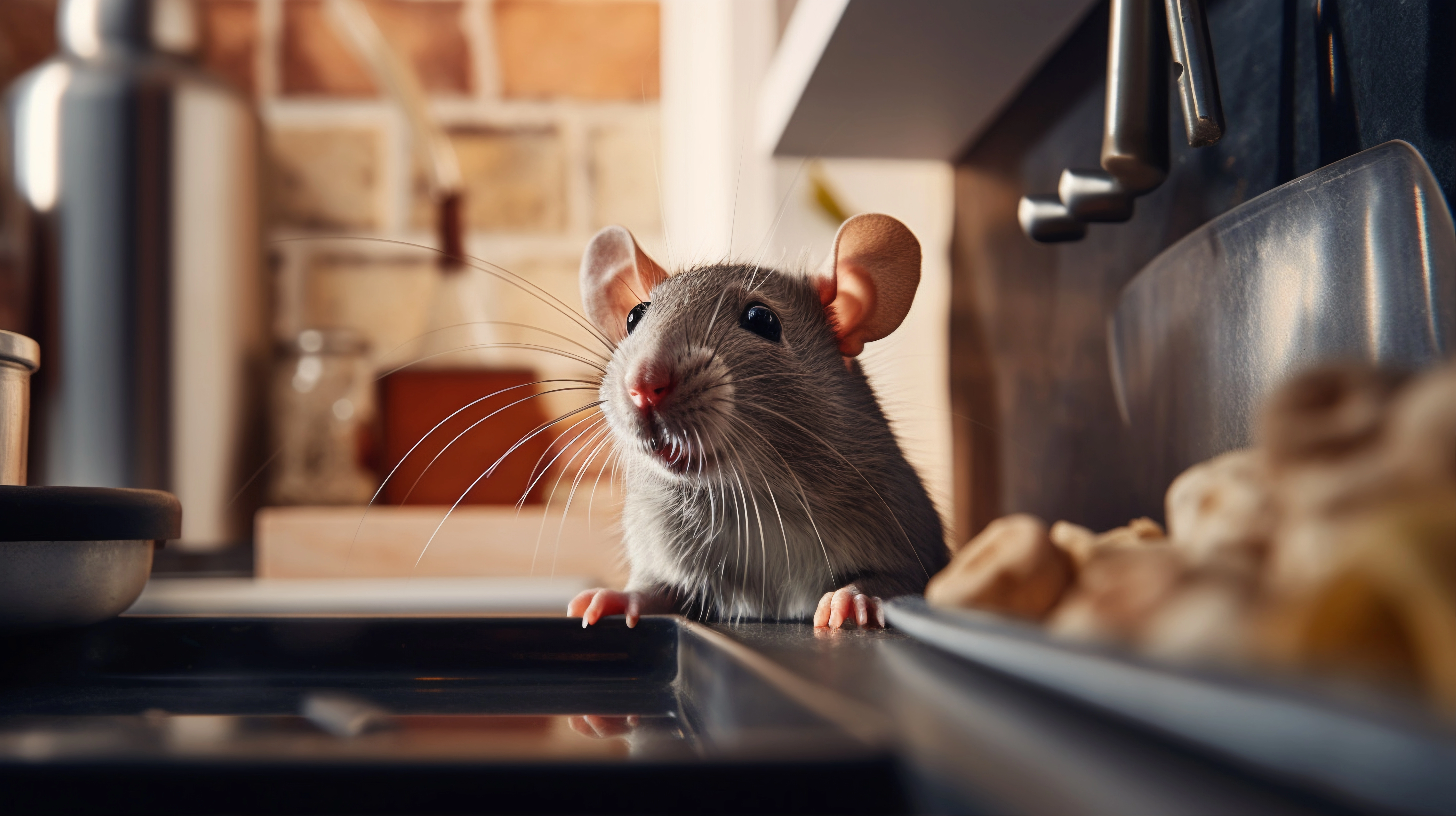Delhi NCR's diverse climate patterns create unique challenges for property owners dealing with rodent infestations. From scorching summers to humid monsoons and chilly winters, each season brings distinct rodent behaviour patterns that require specialised rodent control strategies in Delhi, NCR. Understanding these seasonal variations is crucial for maintaining effective pest management throughout the year.
Understanding Delhi NCR's Seasonal Rodent Patterns
The National Capital Region's climate directly influences rodent activity, breeding cycles, and migration patterns. During summer months (April-June), rats and mice seek cool, moist environments, often moving indoors to escape extreme heat. The monsoon season (July-September) triggers the most significant rodent population explosions, as increased moisture and food availability create ideal breeding conditions. Winter months (December-February) see rodents seeking warm shelter, making indoor spaces particularly vulnerable.
Rodent Control Services in Delhi NCR professionals have observed that rat populations can increase by up to 300% during favourable seasonal conditions. This dramatic surge highlights the importance of proactive pest management rather than reactive treatments.
Summer Rodent Control Challenges (April-June)
Delhi's intense summer heat drives rodents indoors, seeking refuge in air-conditioned spaces, basements, and kitchen areas. During this period, rodent control Delhi NCR services report increased activity in:
-
Commercial kitchens and restaurants
-
Residential basements and storage areas
-
Office buildings with centralised cooling systems.
-
Warehouses storing food products
The heat stress also makes rodents more aggressive in their search for water sources. Property owners often notice increased activity around plumbing fixtures, water tanks, and irrigation systems. Skuas Pest Control recommends implementing moisture control measures alongside traditional baiting and trapping techniques during summer months.
Summer Rodent Control Graph
Rodent Activity Level by Month (Summer Season)
April: ████████░░ (80%)
May: ██████████ (100%)
June: █████████░ (90%)
Water-seeking behaviour peaks in May.
Indoor migration increases by 60%.
Monsoon: The Peak Rodent Season (July-September)
The monsoon period presents the greatest challenge for rodent pest control Delhi NCR operations. Heavy rainfall creates numerous breeding sites, while flooding drives outdoor rodent populations into buildings. Key monsoon-related factors include:
-
Rapid population growth due to abundant food and water
-
Increased disease transmission risks
-
Structural damage from burrowing activities
-
Contamination of stored food supplies
Professional rodent treatment Delhi NCR services become essential during this period, as DIY methods often prove insufficient against large-scale infestations. The combination of high humidity and moderate temperatures creates optimal breeding conditions, with female rats capable of producing litters every 3-4 weeks.
Post-Monsoon and Winter Strategies (October-March)
As temperatures drop and moisture levels decrease, rodent behaviour shifts significantly. Experts from the best rodent control company in Delhi NCR focus on preventing indoor migrations of rodents during this period. Rodents seek warm shelter, making building perimeters, attics, and heating system areas prime targets for infestation.
Winter rodent control service Delhi NCR strategies emphasise:
-
Sealing entry points before cold weather arrives
-
Installing weatherstripping and door sweeps
-
Monitoring heating systems and ductwork
-
Implementing exclusion barriers around building foundations
Integrated Seasonal Pest Management Approach
Effective year-round rodent control requires a comprehensive understanding of seasonal patterns combined with professional expertise. Skuas Pest Control implements integrated pest management (IPM) strategies that adapt to Delhi NCR's unique seasonal challenges.
Spring Preparation (March-April)
Spring marks the beginning of increased rodent activity as temperatures rise and food sources become more abundant. This period is crucial for implementing preventive measures before summer and monsoon seasons intensify rodent pressure.
Key spring activities include:
-
Comprehensive property inspections
-
Sealing potential entry points
-
Removing debris and potential nesting sites
-
Installing monitoring systems
Monsoon Intensification (July-September)
During peak monsoon months, rodent control near Delhi NCR services must adapt strategies to address:
-
Flooding-induced migrations: Sudden population movements from outdoor to indoor environments
-
Increased reproduction rates: Higher survival rates due to abundant resources
-
Disease transmission risks: Wet conditions facilitate pathogen spread
-
Structural vulnerabilities: Water damage creates new entry points
Professional intervention becomes critical during this period, as traditional control methods may be compromised by weather conditions.
Winter Consolidation (December-February)
Winter months provide an opportunity to eliminate established populations before spring breeding cycles begin. Rodent control in Delhi NCR during winter focuses on:
-
Targeting concentrated populations in sheltered areas
-
Implementing long-term exclusion measures
-
Addressing structural repairs before spring
-
Establishing monitoring protocols for early detection
Technology-Enhanced Seasonal Monitoring
Modern Rodent Control Services Delhi's operations increasingly rely on technology to track seasonal patterns and optimise treatment timing. Advanced monitoring systems provide real-time data on rodent activity, helping property owners and pest control professionals make informed decisions.
Digital monitoring tools include:
-
Motion-activated cameras for behaviour analysis.
-
Smart traps with wireless connectivity
-
Environmental sensors tracking temperature and humidity
-
GPS-enabled bait stations for large properties
These technologies enable Skuas Pest Control to provide data-driven recommendations for seasonal pest management strategies, ensuring optimal resource allocation and treatment effectiveness.
Health Implications of Seasonal Rodent Activity
Different seasons present varying health risks associated with rodent infestations. Understanding these patterns helps property owners prioritise protection measures and seek timely professional interventions.
Summer Health Risks
High temperatures and increased indoor activity elevate risks of:
-
Food contamination in kitchens and storage areas
-
Air quality issues from concentrated droppings
-
Structural damage to cooling systems
-
Increased contact between humans and rodents
Monsoon Disease Transmission
The monsoon season significantly increases disease transmission risks due to:
-
Higher rodent population density
-
Wet conditions facilitating pathogen survival
-
Flooding bringing outdoor pathogens indoors
-
Compromised sanitation systems
Winter Respiratory Concerns
Cold weather concentrates both human and rodent populations indoors, leading to:
-
Increased exposure to allergens from droppings
-
Respiratory irritation from confined air circulation
-
Risk of contamination in heating systems
-
Higher likelihood of direct contact incidents
Sustainable and Eco-Friendly Seasonal Approaches
Environmental consciousness in pest control has become increasingly important for Delhi NCR residents and businesses. Seasonal rodent control strategies must balance effectiveness with environmental responsibility.
Sustainable approaches include:
Biological Control Methods: utilising natural predators and ecosystem balance to manage rodent populations. This approach is particularly effective during spring and early summer when natural predator populations are active.
Habitat Modification: Altering environmental conditions to make properties less attractive to rodents. This includes managing vegetation, water sources, and food availability according to seasonal patterns.
Targeted Application: Using minimal chemical interventions only when and where necessary, reducing environmental impact while maintaining effectiveness.
Waste Management Integration: Coordinating pest control with seasonal waste management practices to eliminate food sources and breeding sites.
Commercial vs. Residential Seasonal Strategies
Different property types require distinct seasonal approaches to rodent control:
Commercial Properties
Large commercial facilities face unique seasonal challenges:
-
Food service establishments: Peak risks during monsoon due to increased indoor activity
-
Warehouses: Summer heat drives rodents into climate-controlled storage areas.
-
Office complexes: Winter heating systems create attractive nesting environments.
-
Retail spaces: Year-round vulnerability requires consistent monitoring
Residential Properties
Home-based rodent control Delhi NCR strategies focus on:
-
Apartment complexes: Shared walls facilitate rapid spread during breeding seasons
-
Independent houses: Larger perimeters require comprehensive exclusion measures
-
High-rise buildings: Vertical movement patterns vary by season.
-
Rural properties: Greater exposure to outdoor rodent populations
Economic Impact of Seasonal Rodent Management
Understanding the economic implications of seasonal rodent control helps property owners make informed investment decisions. Proactive seasonal management typically costs 60-70% less than reactive pest control measures.
Cost Factors by Season
Summer: Higher indoor activity increases property damage risks. Monsoon: Peak breeding season multiplies treatment complexity and costs. Winter: Concentration effects require intensive treatment approaches. Spring: Prevention-focused strategies offer the highest return on investment.
Professional rodent control service Delhi NCR providers like Skuas Pest Control offer seasonal packages that distribute costs throughout the year while ensuring continuous protection.
Annual Seasonal Rodent Activity Graph
Rodent Infestation Risk Level Throughout the Year
Jan: ██████░░░░ (60%) - Indoor concentration
Feb: █████░░░░░ (50%) - Reduced activity
Mar: ███████░░░ (70%) - Spring awakening
Apr: ████████░░ (80%) - Heat-driven migration
May: ██████████ (100%) - Peak indoor seeking
Jun: █████████░ (90%) - Continued heat stress
Jul: ██████████ (100%) - Monsoon breeding peak
Aug: ██████████ (100%) - Maximum population
Sep: █████████░ (90%) - Sustained high activity
Oct: ███████░░░ (70%) - Population stabilisation
Nov: ██████░░░░ (60%) - Pre-winter preparation
Dec: ███████░░░ (70%) - Shelter-seeking behaviour
Peak Risk Periods: May, July, August
Optimal Control Windows: February-March, October-November
Professional Intervention vs. DIY Seasonal Approaches
While basic preventive measures can be implemented by property owners, professional rodent control near Delhi NCR services becomes essential during peak seasonal periods. The complexity of managing large-scale seasonal infestations requires specialised expertise, professional-grade materials, and comprehensive treatment protocols.
DIY measures effective for seasonal support include:
-
Regular cleaning and sanitation protocols
-
Seasonal sealing of entry points
-
Proper food storage practices
-
Monitoring for early signs of activity
Professional intervention becomes necessary for:
-
Large-scale population control during breeding seasons
-
Comprehensive exclusion system installation
-
Safe handling of contaminated areas
-
Integrated pest management programme development
Future Trends in Seasonal Rodent Control
Climate change and urbanisation are altering traditional seasonal patterns in Delhi NCR. Rodent Control Services in Delhi NCR providers must adapt to:
-
Extended breeding seasons due to changing temperature patterns
-
Urban heat island effects intensifying summer migrations
-
Irregular monsoon patterns affecting traditional control timing
-
Increased building density creating new migration corridors
Advanced prediction models and climate-adaptive strategies are becoming standard components of professional rodent management programmes.
Frequently Asked Questions (FAQs)
Q. When is the best time to schedule rodent control services in Delhi NCR?
The optimal timing for rodent control Delhi NCR services are during transition periods—specifically February-March and October-November. These windows allow for comprehensive treatment before peak breeding seasons. However, emergency interventions may be necessary during monsoon months when infestations peak. Pre-monsoon treatments in May-June can significantly reduce population explosions during the rainy season.
Q. How does the monsoon season affect rodent control effectiveness?
Monsoon conditions present both challenges and opportunities for rodent pest control in Delhi NCR operations. While heavy rainfall can wash away some treatments, the season also concentrates rodent populations in predictable shelter areas, making targeted treatments more effective. Professional services adjust bait formulations and placement strategies to maintain effectiveness during wet conditions.
Q. What are the early warning signs of seasonal rodent infestations?
Key indicators vary by season but include summer—increased indoor sightings and water source contamination; monsoon—sudden appearance of droppings and gnaw marks; and winter—scratching sounds in walls and heating systems. Best rodent control company in Delhi NCR professionals recommend monthly inspections during peak seasons to catch infestations early.
Q. How often should I schedule professional rodent control treatments?
Treatment frequency depends on seasonal risk levels and property vulnerability. High-risk properties may require monthly treatments during monsoon season, while quarterly services suffice for low-risk environments. Rodent treatment Delhi NCR specialists typically recommend customised schedules based on property assessments and historical infestation patterns.
Q. Are seasonal rodent control methods safe for families and pets?
Modern rodent control service Delhi NCR methods prioritise safety while maintaining effectiveness. Professional services use targeted application techniques and pet-safe formulations. Seasonal strategies often emphasise physical exclusion and habitat modification over chemical treatments, particularly in residential environments with children and pets present.
Conclusion
Effective seasonal rodent control in Delhi NCR requires understanding the complex relationship between climate patterns and pest behaviour. By implementing season-specific strategies and maintaining professional partnerships, property owners can achieve comprehensive year-round protection against rodent infestations.
The investment in professional seasonal pest management programmes pays dividends through reduced property damage, lower health risks, and decreased long-term control costs. As Delhi NCR continues to grow and climate patterns evolve, adaptive seasonal strategies will become increasingly important for maintaining pest-free environments.
For comprehensive seasonal Rodent Control Services in Delhi NCR, contact Skuas Pest Control to develop a customised year-round protection plan tailored to your property's specific needs and seasonal vulnerabilities.
Disclaimer: This content is for informational purposes only. Consult Skuas Pest Control professionals for specific rodent problems. Results may vary by property.

